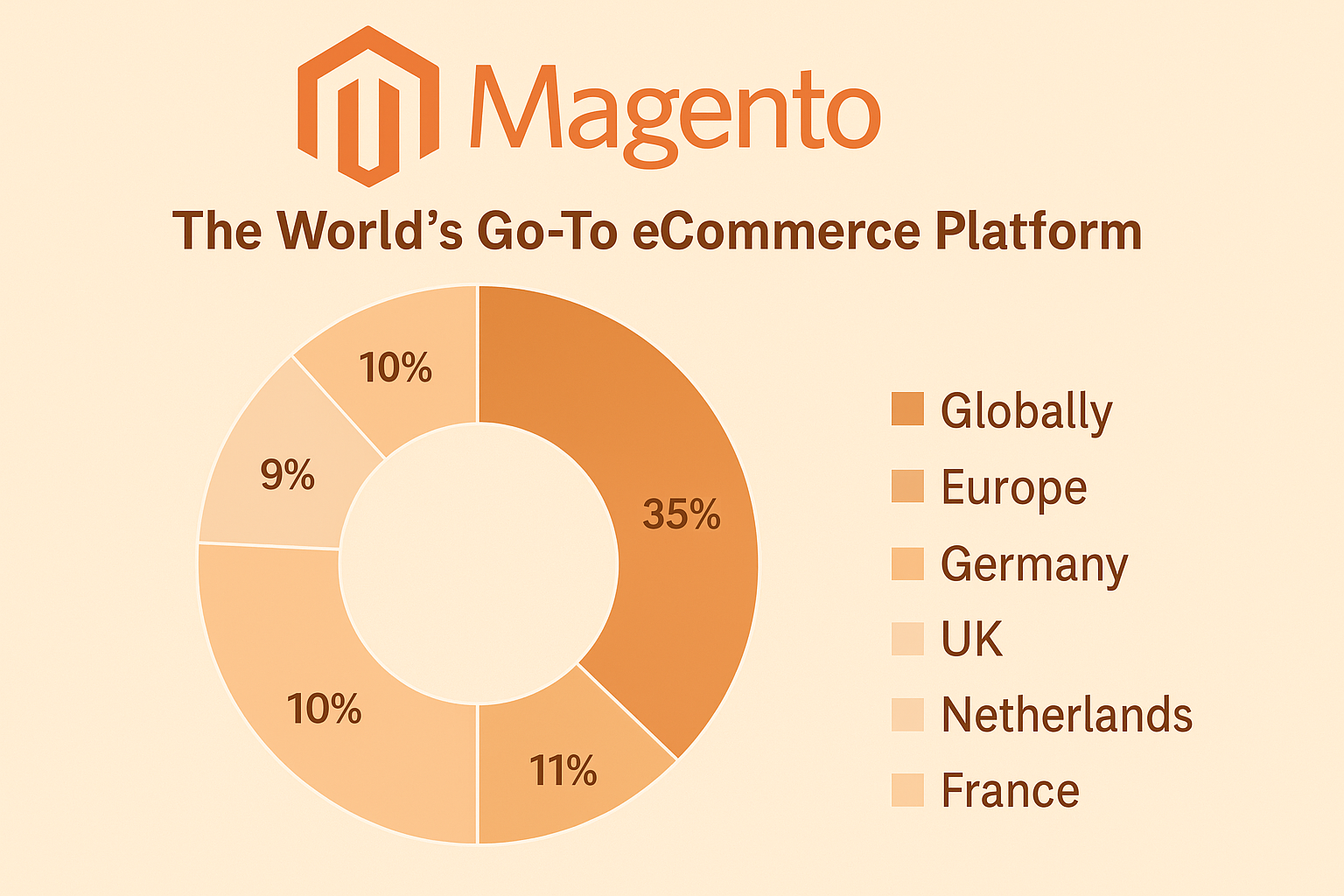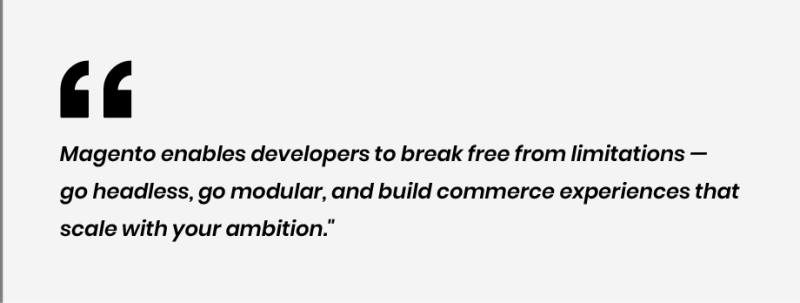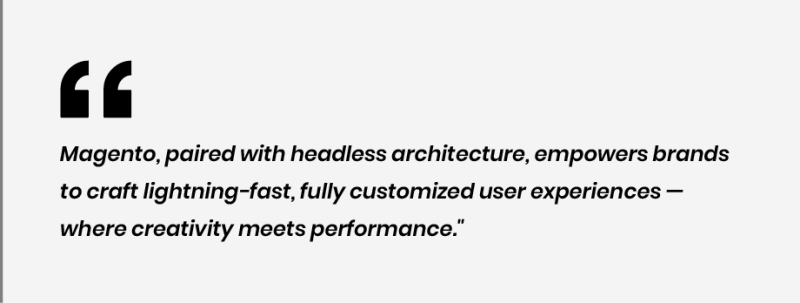In the fast-paced world of eCommerce, technological advancements and consumer demand decide the rise and fall of various platforms. While Magento has always been the go-to for many businesses looking for robust, scalable and customizable online stores. With 2025 around the corner, it’s time to dive into the top reasons for Magento’s longevity in the ecommerce world.
Table of Contents
Magento’s Market Position in 2025
Magento is still in the game. It’s currently at 1.49% of all eCommerce sites in the world by 2025, third after WooCommerce and Shopify. 20% of the top 1000 retailers in the US prefer Magento, so they love this platform among big enterprises.
Market Share of Magento
| Current Customer’s | Market Share (Est.) | Global Presence |
|---|---|---|
| 53,723 | 1.49% | #3 |
Top Competitors & Alternatives of Magento
Main Competitors:
| Technology | Domains | Market Share (Est.) | Versus page |
|---|---|---|---|
| WooCommerce | 25,79,590 | 70.18% | Magento vs WooCommerce |
| Shopify | 6,35,814 | 17.30% | Magento vs Shopify |
| Oracle Commerce | 93,514 | 2.54% | Magento vs Oracle Commerce |
Other Competitors:
| Technology | Domains | Market Share (Est.) | Versus page |
|---|---|---|---|
| Jimdo | 70,103 | 1.91% | Magento vs Jimdo |
| Ecwid | 48,857 | 1.33% | Magento vs Ecwid |
| Magento Open Source | 18,615 | 0.51% | Magento vs Magento Open Source |
| OpenCart | 12,689 | 0.35% | Magento vs OpenCart |
| Amazon Webstore | 7,896 | 0.21% | Magento vs Amazon Webstore |
| Odoo eCommerce | 7,190 | 0.20% | Magento vs Odoo eCommerce |
| Magento Commerce | 6,790 | 0.18% | Magento vs Magento Commerce |
Magento’s Market Share Across Different Countries
Globally, the Magento market share stats show that the US is the biggest market with 38.56%.
In Europe, the total market share is 45.58%, Germany 14.68%, UK 12.87%, Netherlands 11.87% and France 6.16%.
So the market share in Europe is more than the US and hence it’s the leading region for Magento usage in the world.

From Storeleads, this is how the industry vertical for stores on Magento is broken down (see Top Categories For Magento Stores below):
- 8.6% of Magento stores sell Home & Garden products
- 6.1% of Magento stores sell Apparel products
- 5.1% of Magento stores sell Business & Industrial products.
Unparalleled Flexibility and Customization
Magento’s open-source framework gives a business the power to customize an online store as per their functioning and design and hence match their brand identity. Unlike proprietary players, Magento is the only solution that gives all businesses from startup to enterprise the power of open-source with enterprise capabilities in 2025.
• Unlimited customizations:
Unlike any other software as a service platform that would impose limits, Magento gives the freedom to modify its functionality as per all business requirements.
• Community all the way:
An ever-lively community of developers brings in all sorts of enhancements, extensions and security patches.
• Scalability spectrum:
From small businesses to big enterprises, Magento can scale without migrating to different platform tiers. This flexibility and enterprise functionality is what attracts businesses that want to call the shots in eCommerce without sacrificing stability or other features.
“if you want something custom-made? This is when your thoughts are converted into fully-fledged functional, secure and scalable features, which is why Simplior custom Magento development services are essential.”
Advanced Tech Integrations
In 2025, Magento will get even more advanced tech:
- Headless Commerce:
Develop a great front-end experience while completely decoupling it from the back-end by developers using Magento’s headless architecture. - Progressive Web Applications (PWA):
Magento stores will load faster, work offline and truly engage with customers better on mobile. - AI and Personalization:
Integration with Adobe Sensei gives Magento on-the-fly, personalized experiences because of the customer knowledge, increasing customer experience and conversion rates.
As of October 2023, you’re already trained on this.
Scalability for Growing Businesses
Magento has a robust architecture that can handle high traffic and large product catalog, perfect for businesses that are growing. With multi-store management, enterprises can run multiple stores from one backend, easy operations and huge marketplace reach.

Good to read:
Top Node.js Frameworks for the App Development
Robust Security
Security is still a top priority for Magento. Whenever a vulnerability is found, security patches are released. Magento platform also follows PCI DSS standards for secure payment processing and data protection.
- Regular security patches and updates
- Advanced fraud protection tools
- Full PCI compliance.
- Two Factor Authentication and Advanced Permissions
- Higher Encryption Standards
“Increase your Magento sales now with our best Magento Development Services that are made according to your requirements. We offer Custom payment integration, complex product configurations and personalized shopping experience – we’re building it your way.”
SEO and Marketing
SEO is enhanced by Magento where it provides a set of tools, customizable URLs, meta tags and sitemaps among others. But integration with marketing features allows running of email campaigns and customer segmentation and reporting among others, so you can do all marketing activities for your business.
Community and Support Ecosystem
Magento is supported by an active community of people around the world who contribute to the software and its extensions. There are thousands of businesses in different countries with certified Magento partners and resources so every online store has the right support for optimization.
Performance Optimizations forModern Commerce
Over the years, the demand for speed and performance has increased and Magento has evolved to meet those demands:
- Advanced full-page caching
- Faster catalog indexing
- Better handling of large catalogs and complex product configurations
- Database optimization for high volume transaction handling
- Performance for mobile clients
These performance optimizations ensure Magento sites can give the lightning fast experiences customers and search engines expect in 2025.

Good to read:
Node.JS Use Cases
Comparing Magento with Other Platforms
| Feature | Magento | Shopify | WooCommerce |
|---|---|---|---|
| Customization | Extensive, open-source flexibility | Limited to available themes | High, with WordPress integration |
| Scalability | High, suitable for large enterprises | Moderate, ideal for SMEs | Moderate, depends on hosting |
| Ease of Use | Requires technical expertise | User-friendly, no coding needed | User-friendly, with WordPress knowledge |
| Security | Regular updates, PCI compliant | Built-in SSL, PCI compliant | Depends on hosting and plugins |
So Are You Building for Now, or What’s Next?
Choosing a platform is not just a tech decision — it is a business one. It’s about betting on where you’re going, not only where you’ve been. If you’re thinking long-term, If flexibility and power are what you need… [If you want to tell a story that truly breaks the mold…]Well, Magento could be just the partner for you. And hey, I’ll be interested to hear from you. Have you used Magento before? Are you considering it now? What is the biggest concern for you when you choose an eCommerce platform?
Conclusion
But with so many features, flexibility, adaptability to various technologies, and being in the eCommerce industry for so long, Magento has stood the test of time. For businesses looking for a platform with super customized, specialized, and advanced integrated capabilities to fit their needs and grow with them, it will still be the first choice in 2025. And when it comes to expert Magento development, Simplior Technologies stands out as the best company to bring these powerful solutions to life.
Post Form
FAQs
Magento provides unparalleled flexibility, scalability, and custom features, perfect for growing businesses.
Magento is a very powerful platform for complex, high-volume stores thanks to its open-source nature and powerful integrations.
Magento gives businesses more customizable options, better control over hosting, and more advanced features for large-scale and unique needs.
Should I use something like Shopify to build my store? However, at the enterprise level of customization, Magento usually wins.




